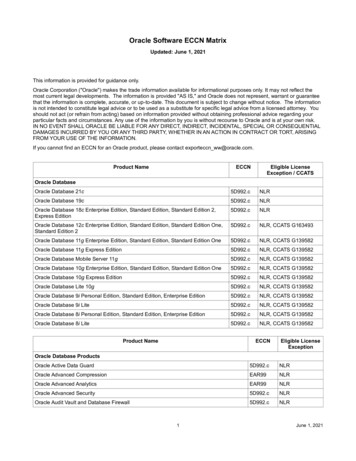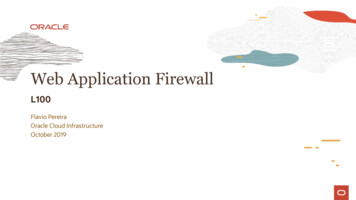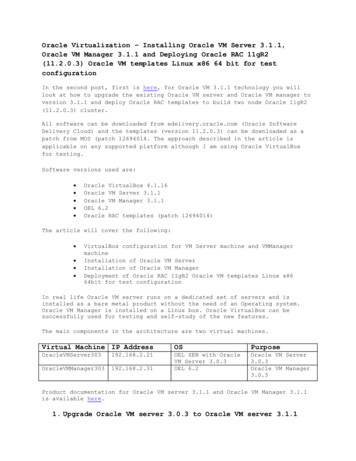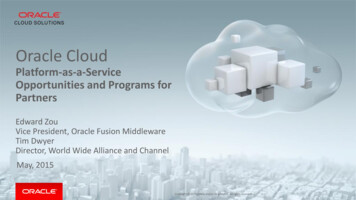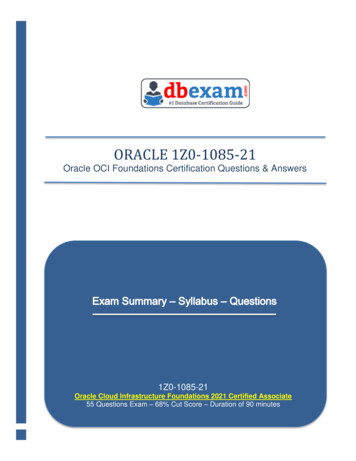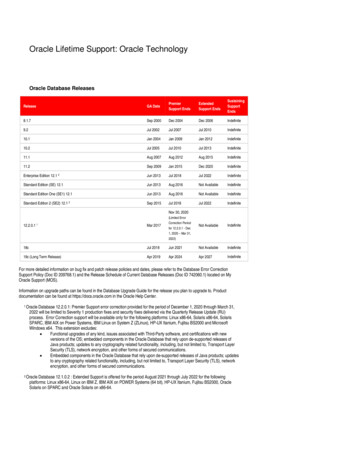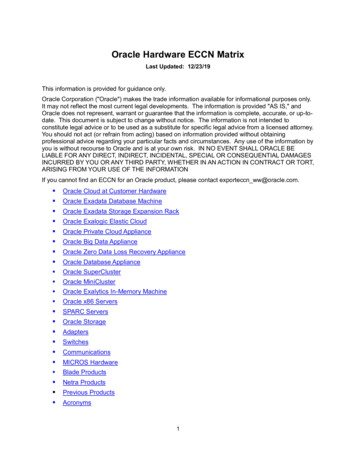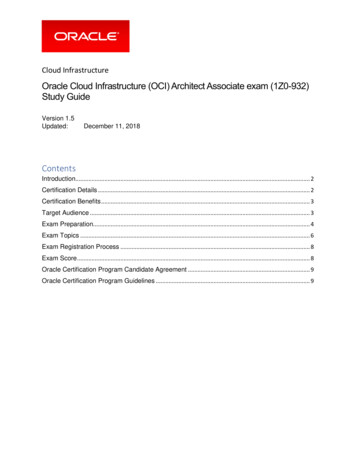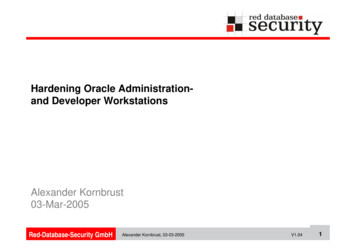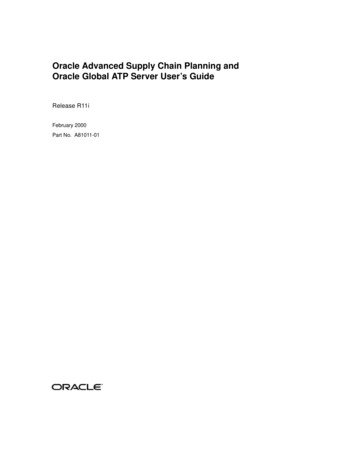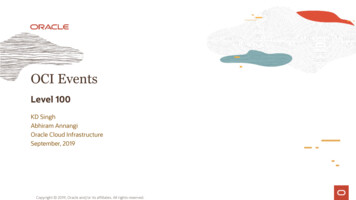
Transcription
OCI EventsLevel 100KD SinghAbhiram AnnangiOracle Cloud InfrastructureSeptember, 2019Copyright 2019, Oracle and/or its affiliates. All rights reserved.
Safe harbor statementThe following is intended to outline our general product direction. It is intended for informationpurposes only, and may not be incorporated into any contract. It is not a commitment to deliverany material, code, or functionality, and should not be relied upon in making purchasingdecisions.The development, release, timing, and pricing of any features or functionality described forOracle’s products may change and remains at the sole discretion of Oracle Corporation.Copyright 2019, Oracle and/or its affiliates. All rights reserved.
OCI Events Service - ObjectivesAfter completing this lesson, you should be able to understand:What are events and how can we use them?Events Service overviewKey features of Events ServiceCore concepts of Events ServiceCommon use-cases of Events Service3Copyright 2019, Oracle and/or its affiliates. All rights reserved.
OCI Events Service - Overview OCI Events service is a fully managed event-routing platform that simplifies the creation ofevent-driven cloud-native applications and serverless workflows. OCI Events service provides a platform where customers can subscribe to changes in theirresources and automatically react to them in near real time using Fn, trigger notifications, orwrite to stream for later analysis. Open Source - the Events service implements the Cloud Native Computing Foundation’s(CNCF) cloudevents open source standard. CloudEvents describes event data in a common,consistent, and accessible way across cloud native applications.4Copyright 2019, Oracle and/or its affiliates. All rights reserved.
Key FeaturesOCI Events service provides a robust Event-Routing Platform with some key features Integration with Oracle Functions, Oracle Streaming Service, and Oracle Notification Service,which provides you with a powerful reactive programming model for staying informedabout your cloud environment. Support for diverse suite of out-the-box event types - supports all API call events from allyour OCI resources (Create, Update, Delete via Audit), as well as scenario-specific eventsfrom Object Storage and Autonomous Database (such as Database Backup Complete). Integrated with Identity and Access Management and Monitoring services Accessibility through REST APIs, OCI console, SDKs, CLI, Terraform5Copyright 2019, Oracle and/or its affiliates. All rights reserved.
Common Use-casesPolling resources continuously to track changes has problems More CPU Cycles More Engineering Resources More Network Traffic Delay in RespondingFollowing are some common actions that Events can perform: Trigger a function when new files are uploaded in an Object Storage bucket. Publish a notification when long-lived tasks complete, such as Autonomous Databasebackup completion. Archive all events in a specific compartment to a stream for later analysis. Publish a notification when a new resource is created or deleted in a compartment.6Copyright 2019, Oracle and/or its affiliates. All rights reserved.
ConceptsThere are three core concepts in OCI Events service: Events - A structured and schematized message that denotes a change in a resource. Rule - The object where a user defines which events they care about, and trigger an action ifit occurs. A first-class OCI object created per compartment. Actions - The user-defined response to when an event occurs. For example, triggering afunction, or writing to a stream.7Copyright 2019, Oracle and/or its affiliates. All rights reserved.
OCI services that trigger Events and take ActionsComputeFunctionsTrigger serverless codeNetworkStorageEventsDatabaseEvents ServiceConfigureRulesNotificationsAlerts viaemail/PagerDutyStreamingRouting for analyticsEtc.Events Service integrates with OCI Services at the platform-level to deliver resource change events.8Copyright 2019, Oracle and/or its affiliates. All rights reserved.
Concepts - What are Events?An event is a structured, lightweight, actionable message that denotes a change in a resource.Unlike raw generic log entries, events have derived context and structure, and are guaranteed tobe actionable.An event can be: User initiated CRUD operation - "Bucket Updated", "Bucket Deleted" Resource life cycle state change - "Instance Stopped", "Backup starting" System event - "Instance Rebooted - Hardware Failure" (Via PULSE)Each event describes: The source (i.e service responsible) Time stamp eventType (i.e Backup Complete) a detailed service-specific inner payload to describe the change and resource in more details(including the tags associated with the resource).9Copyright 2019, Oracle and/or its affiliates. All rights reserved.
Concepts - How does an Event look like?Events follow CNCF format and has the following schema:{"eventType": "string", #Example: ADW.instance.backup.complete"eventTypeVersion": "string","cloudEventsVersion": "string","source": "URI/string", #Example /service/dbaas/resourceType/ADW/"eventID": "string","eventTime": "timestamp", #Time the event occured"contentType": "string", #application/json"extensions": {"compartmentId": "string" #extension to show compartment ID},"data": "JSON object" #Inner payload with service specific details.}10 Copyright 2019, Oracle and/or its affiliates. All rights reserved.
Concepts – What are Rules?To interact with the OCI Events service, users create and manage "Rules".Rules are objects that allow customers to select which event types to monitor, andautomatically trigger actions when those events occur. To be able to create rules in a givencompartment, users will need the INSPECT compartment permission.All rules are validated for IAM permissions. A rule is simple; to create one, the user specifies: Name & Compartment - A name, and the compartment where you want the rule to becreated. Trigger Condition - The event types you care about, as well as any other property filters. Auser can subscribe to ALL events in their compartment.Example: "Event Type Delete bucket" and "Tags Prod Dont Delete" Response Action - The automated action to be executed once the condition above is met.You can have multiple actions per rule.Example: "Notify DRI (ONS)" and "Trigger my backup scripts (Fn)"11Copyright 2019, Oracle and/or its affiliates. All rights reserved.
Design Considerations - Rules Rules are compartment based, and will support nested compartments. If a customer wantsto set up a tenancy-wide rule, they can create one in the root compartment. To be able to create a rule in a given compartment, customers will need the compartmentINSPECT permission. All rules, and actions are validated for proper IAM permissions.Customers will also need the 'manage cloudevents' permissions to be able to CRUD rules. Before using the service, customers will need to set a policy to allow events service to deliverevents to action resources. When events are generated, they also include the tags of the resource that fired theevent. Customers will be able to create rule filters that match their resource tags. Rulesresource themselves will also support tags. The max amount of rules a user can create in their tenancy is 50. (This can be increased)12 Copyright 2019, Oracle and/or its affiliates. All rights reserved.
Concepts – What are Actions? Actions are the user defined response to a rule being matched. A user can specify multiple actions per rule. The service guarantees at least one delivery attempt for all actions. Supported actions include: Trigger Function (Fn) Publish notification (ONS) Output to Stream (OSS)13 Copyright 2019, Oracle and/or its affiliates. All rights reserved.
IAM policies required to work with Events #1Policies for the Events service so that it can deliver event messages to action resources,which can be any combination of topics, streams, or functions give the Events service the ability to deliver events messages to a topicallow service cloudEvents to use ons-topic in tenancy policy for Events to deliver event messages to functionsallow service cloudEvents to use functions-family in tenancy policy for Events to deliver event messages to streamsallow service cloudEvents to use stream-push in tenancyallow service cloudEvents to read streams in tenancy14 Copyright 2019, Oracle and/or its affiliates. All rights reserved.
IAM policies required to work with Events #2Policies for users so that they can create and manage rules give users inspect access to resources in compartments to select actionsallow group RuleAdmins to inspect compartments in tenancy give users manage access to rules for Eventsallow group RuleAdmins to manage cloudevents-rules in tenancy give users access to Streaming resources for actions (if required)allow group RuleAdmins to inspect streams in tenancyallow group RuleAdmins to use stream-push in tenancyallow group RuleAdmins to use stream-pull in tenancy give users access to Functions resources for actions (if required)allow group RuleAdmins to use virtual-network-family in tenancyallow group RuleAdmins to manage function-family in tenancy give users access to Notifications topics for actions (if required)allow group RuleAdmins to use ons-topic in tenancy15 Copyright 2019, Oracle and/or its affiliates. All rights reserved.
Events Service MetricsMetrics supported for: Events received from all resources Events matched by a rule Successful deliveries by a rule Failed deliveries by a rule16 Copyright 2019, Oracle and/or its affiliates. All rights reserved.
Service GuaranteesOCI Events Service offers the following guarantees: If an event is ingested, it guarantees that it will be evaluated at least once against user rules. If a rule is matched, it guarantees at least one delivery attempt for all actions. Events are NOT guaranteed to be processed or received in order. If an action target is not responsive, the service will retry delivery for up to 5 hours or until anon-retryable error occurs. Otherwise a failure metric will be emitted, and no further retrieswill occur.17 Copyright 2019, Oracle and/or its affiliates. All rights reserved.
Configuring Events Service Rules in OCI ConsoleStep 1: Select Service and Event TypeStep 2: Set a filterStep 3: Select an action12318 Copyright 2019, Oracle and/or its affiliates. All rights reserved.
Event-Driven Design Patterns - Common Use Cases19Event-drivenapplicationsWeb, Mobile, IoTBackendsReal-time File,StreamProcessingDevOps, BatchProcessingGlue CloudServices, EventdrivenSecurityOperationsIT OperationsMulti-CloudCopyright 2019, Oracle and/or its affiliates. All rights reserved.
An Example of OCI Events Service in ActionFunctionsATPEmail DeliveryATPProvisionATP InstanceRequestCreateInstance EndEventATP InstanceProvisioningCompleteHTTPS (custom URL)EventsNotificationsTriggerfunctionsSlack Subscription 20 Copyright 2019, Oracle and/or its affiliates. All rights reserved.Functions runs scripts to create schemas, tablesand import golden data.Notifications triggers email and PagerDuty alerts.
More Examples – Automate Corporate Security tworkAccess LogsLog Files inObject StoreTriggerfunctions21Copyright 2019, Oracle and/or its affiliates. All rights reserved.TriggerfunctionsFunctionsComputeFunctions check if the instancecomplies with security policies. Ifnot, kill the instance & send a newprovision instance requestFunctionsSplunkFunctions read the network accesslogs and send them to customer’sSplunk for security analysis
Demo: Integrating an OCI Service event with Events, Functions,Notifications and StreamingFunctionsOCIEventsComputeProvision orTerminateInstanceRequestInstanceProvisioning onsCopyright 2019, Oracle and/or its affiliates. All rights reserved.Create a new Object StoreBucket on provisioning anddelete it on instanceterminationEmail DeliveryMessageConsumersStreaming22Storage
Summary Fully managed event ingestion and routing platform that enables users toautomatically detect changes on their resources and act upon them.Customers simply pick the services they care about, the type of event they want tomonitor, and the actions they want to take.Free service with a native CNCF cloudevents support.Integrated with IAM and MonitoringAccessible through REST APIs, OCI console, SDKs, CLI, TerraformRoadmap Support for custom events via OSSSupport for “Advanced” flow, which allows users to input custom verbose json for morecomplex rules.23 Copyright 2019, Oracle and/or its affiliates. All rights reserved.
Oracle Cloud always free tier:oracle.com/cloud/free/OCI training and certification:cloud.oracle.com/en US/iaas/trainingcloud.oracle.com/en /oracle-certification-path/pFamily 647OCI hands-on le learning library videos on YouTube:youtube.com/user/OracleLearning24 Copyright 2019, Oracle and/or its affiliates. All rights reserved.
Title: Events 100 Author: Oracle Corporation Subject: Events 100 Keywords: OCI Events Created Date: 20191120222324Z
